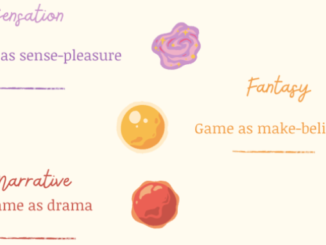
What will people want to play in 2040?
As a futurist, I rely heavily on a skill called Scanning. Scanning is how we start to know the future and begin to expand our time horizon. It gives us a feel for the patterns that influence the future. Scanning is one of the most universal futurist techniques for sensing and knowing what is changing. Done well, scanning has meaningful insights for future-oriented thinking.
I think anyone can learn to identify emerging ideas, not just futurists. What are we looking for? Some people, like my favorite futurist Amy Webb, call them “Signals.” We look for “firsts.” We pay attention to empirical projections, models, and forecasts. We seek wildcards and black swans; that is, what might surprise us. We become intimately familiar with the fringes of society. And we do this by reading and monitoring dozens and dozens (and dozens) of media every day.
I would like to share with you some of the cutting-edge information I have encountered recently in my scanning that I think will help you maximize your experience when it comes to thinking about the future as a game enthusiast or designer.
Below are five insights, or we might say, “foresights” to help you think creatively about what the next generation will need and want from a gaming experience. I will explain five examples of emerging cultural shifts that should make us all question what games and entertainment will look like in 2040: Life extension and human enhancement, digital nomadism, surveillance capitalism, biophilia, and brain hacking. Let me go through each one.
-
Life Extension and Human Enhancement

The first signal is life extension and human enhancement. The modern human life span is increasing across the board. Now that a life of 100 or more years is increasingly possible, if not likely, how does this change how people will spend their time?
First of all, there is a very vibrant sense today that learning should be lifelong. As we experience the social phenomena of older people with a better quality of life having a larger role in society, we should expect the way they spend their time to become more meaningful across the lifespan.
With more years of life, people may move jobs more often or want and need to learn new things frequently, and games can help with this. Gaming keeps the mind active and games can be educational. A longer life span within the rapid pace of today’s technological change means more tools to learn and different technology revolutions to comprehend. A person of 100 years of age today has already experienced the heyday of radio, television, internet, and now social media. Imagine how many more technologies a person born in 2030 will need to learn before they die should we keep up this pace. Games may be able to help a lot in this area.
An extended lifespan also equates to more variety in life phases. Don’t forget that childhood as we know it today is a concept that has only been around for about 150 years. Could there be future life stages that a centenarian society might need to account for all the extra time? There could be a large gap in years between the onset of adulthood and individual commitment to so-called “adult” activities, such as marriage and parenthood. Furthermore, gaming could lose its connotation as a youthful pastime, and become more universal.
Along with medical innovations that can ensure a longer lifespan are the technologies that can create an intellectually and physically enhanced person. This might sound like science fiction, but in 2018 a Chinese doctor admitted to genetically enhancing his own children to be immune to contracting HIV. In doing this procedure, he inadvertently modified their brains as to provide them with a form of superintelligence (oops). As a future-shaping signal, this was a relevant “first” of possibly many more events as medical science reaches a turning point permitting human engineering that will have an effect on how we compete, think, and play.
-
Digital Nomadism

The second driver that might shape the future is a new concept known as the Digital Nomad. A digital nomad is a highly mobile person who works remotely. It’s been observed that COVID-19 has accelerated the digital nomad trend dramatically, allowing more people than ever to work and learn from home.
Prior to 2020, a digital nomad would jet between tropical locations to convenient cities perhaps stopping at friend’s and family homes, with just a laptop and a rolling suitcase. During COVID, digital nomads have taken the opportunity to work out of hotels and AirBnBs, and some have even taken on truly nomadic lifestyles by living on the road in mobile homes. As the pandemic winds down, it’s very possible our jobs and our studies will be unable to keep us tethered to a single geographic location. Digital nomads are the future.
The rise of the digital nomad suggests that we will all be living far deeper in the metaverse, which is, according to Wikipedia: “a collective virtual shared space, created by the convergence of virtually enhanced physical reality and physically persistent virtual space, including the sum of all virtual worlds, augmented reality, and the Internet.” If you have ever played an online game or taken an online class, you are already in the metaverse. But, in 2040, you might be playing in virtual reality, augmented reality, from an object in the internet of things, or as a holographic figure. Or you might just communicate information via brain waves, but I’ll get to that later.
-
Surveillance Capitalism

The third shift impacting the future of games concerns the rise of a new business model known as surveillance capitalism. All the big technology companies, from Facebook to Google, make a nice, fat profit from the information they collect about the people who use their “free” services. As The Economist indicated a few years ago with a major 2017 cover story, data is the new oil. What they meant was that the previous winners of the game of capitalism ran the fossil fuel industry, but the scales have now tipped in favor of the Ubers and the Amazons. The most valuable natural resource today is us.
I am always surprised at how few people are aware of this arrangement. I have actually had students ask me, “Is it true that Facebook is spying on us and Siri is always listening?” It’s almost an urban myth at some level, where people sort of hear about it but can’t confirm the existence of our self-imposed surveillance system. It is important to see how digital tools have created an entirely new consumer structure, and we need to be upfront about it because, as the saying goes, if you’re not paying for the product, you are the product. So, how must we play differently, especially when we are now products? How do we prepare to have fun and learn in this new world? We need to consider this so that, as digital nomads, we retain our humanity throughout our travels in the metaverse.
-
Biophilia

An American teenager recently won a sustainability award for her project growing a fully functioning canoe from mycelium, or mushrooms. She demonstrated rowing it in a lake and in doing so started a conversation about a future where we can grow, rather than construct, the items we need. I relate this story to a vibrant trend known as biophilia, or love of nature.
I am going to make the argument that Gen Z has a bad case of biophilia. Bad in a good way. The young people of today are embracing nature: gardening, indoors and outdoors, is on the rise. Pets have become more common than children in the USA. House plants are a requisite of today’s design aesthetic. By 2040, I think biophilia will be deep-rooted in our society in a number of ways.
For example, the Pacific Garbage Patch is already a major preoccupation of youth around the world. For most of their lives, we have had a cluster of plastic and trash the size of a continent floating in our ocean. There are many campaigns around the world to combat this damage, and one of them involved a design for a floating recycling center that would float around the ocean picking up trash and transforming it into useful products. The rise of Greta Thunburg and other major youth activists has got the world’s attention on these topics. I can easily imagine the gamification of the solution to these climate challenges by 2040.
-
Brain Hacking

The fifth example of techno-social shifts on the horizon concerns a new theory of “The Extended Mind,” which suggests that we are on the path to merging mind and machine. The theory goes that a smart device, like a phone or tablet, can supplement our brain power by helping us remember things, keep track of our activities, and basically free up our own cognitive capacity. By 2040, we may live in environments that make us “smarter” by virtue of a continuously extended mind.
Currently, we are witnessing the rise of brain hacking using a technology called Brain Computer Interface, or BCI. BCI is a rising technology of the 2020’s and it may one day be pervasive in our homes, schools, and workplaces. It is a technology meant to reduce the friction between man and machine by transforming the brain into a seamless user interface to interact with artificial intelligence (AI) and other digital tools.
Elon Musk plans to see his own BCI device, called Neuralink, implanted in a human brain by late this year. Already monkey with a Neuralink implant recently demonstrated the ability to play video games with its mind. Though Musk has emphasized Neuralink’s immediate and therapeutic application to victims of paralysis or neurological disease, he champions a longer-term vision where brain implants allow us to achieve a number of brain hacks, including being able to communicate telepathically, even after we die.
Some brain hacks require no implant: a startup called Nēsos has a set of earbuds that use electricity to treat rheumatoid arthritis, hacking the brain to reduce inflammation. Other companies, like Valve, are exploring BCI in a gaming device which would essentially read your mind. Hacking the brain for leisure, novelty, medical treatment, and learning are all on the horizon, bearing many implications on the future of the way we live.
In the future, it is possible that BCI will be connected to a digital assistant, for example, which might answer all our questions for us. In that case, do we still need to learn stuff? Or, by 2040 we may own devices that can detect brain waves so that we are able to control whatever film or show we are watching, or use telepathy to communicate. BCI can also allow users to compose a song with their mind, so it will allow us to get more in touch with their creative side. And, since it is possible to learn via BCI, students may eventually just hack their brains to academically advance, rather than be given tests or grades. We might someday hack our way into college, a new job, or promotion.
Conclusion
I hope you enjoyed this quick tour through the signals running through my head when I think about the future of gaming and how the gaming world can embrace futurism. I hope that you learned something that helps orient your thinking toward the surprising and unexpected twists likely in our unfolding human story. The five examples I sense on the horizon are only some of the fascinating ripples of change taking place. In fact, COVID and the subsequent lockdown policies have provided an unusual opportunity to step back and assess our current situation. A year into this pandemic, I think it’s fair to refer to 2020 and maybe 2021 with a new term I recently learned: “Anthropause.” Archaeological scholars have devised this term to describe a brief pause in human activity, such as the one we’ve been in since last year. I hope this anthropause gives way to a much more positive and promising future to 2040 and beyond.
- Playing games with the next generation - 12th March 2021





Hi Alexandra! Thank you for this piece and sharing your thoughts/findings on some trends heading into the next decade(s). However, as a professional game designer, I feel that some of these trends don’t really answer the original question of “What will people want to play in 2040?”. Do you feel that these trends will have a greater impact on the actual content of the game or the way the games are interacted with?
Best,
George
Hi George,
First of all, thank you very much for reading the article. I appreciate your interest.
I meant the trends and ideas I presented in both of the ways you suggested. The concepts could become the basis for game characters, settings, questions/challenges or game design in terms of function. How about a game that caters to digital nomads, or a biophilic gaming system made with plants that have electrodes which allow you to communicate with each other?
My article was meant to inspire people who think about games of the future with things they may not have considered before.
I hope that’s helpful! Thanks again for reading.
Alexandra